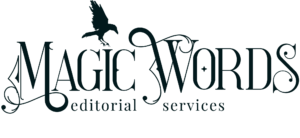
The Author-Editor Relationship: A Cautionary Tale (and How to Have a Good Collaboration)
The author-editor relationship always carries the potential to be fraught with misunderstanding and hurt feelings—on either side. Even when both parties want nothing but the best for each other, even when both are working toward the same goal of making a book the best it can possibly be, without careful handling, such a partnership can quickly go south.
It helps when one or the other person in the relationship isn’t, well, a frabjous jerk.
Follow me, magic writer, into the depths of an editing project where one party was professional, courteous, and respectful, and the other was . . . not. A cautionary tale, if you will, where I name names* and serve up the hot goss, along with some tips to help prevent you from suffering from an author-editor relationship gone wrong .
That’s Not Why It’s Called “Slugging”: A Bad Author-Editor Relationship
When the project hit my inbox, I blinked. Then blinked again, just in case the author’s name I was seeing was, in fact, the one I thought it was. Yup. The publisher I work for, Tor, had just sent me the latest installment in a very long-running series by a fancy-pants Big-Time Author for a proofread.
GULP. And . . . woohoo! My mind was abuzz with how great this cover would look in my portfolio and how fun it would be to review the work of an author I’ve admired for literal years. So I immediately got to work, itchy with anticipation.
My task was to review the typeset page proofs of the manuscript—a PDF of a book that’s been formatted exactly as it will look for publication—for the last round of editing that would go to the author for review.
I was also asked to “slug” against the copyedited manuscript. Basically, slugging means I compare the PDF version to the copyedit of the same manuscript in Word, making sure that any changes the author made after the copyedit was completed were carried over into the proofs, and any comments the author left or responded to were resolved.
Most of the time, being asked to slug is a delight. It’s a chance for me to eavesdrop on the conversation an editor has with an author in the comments, to see the editor’s decisions in real time and the author’s responses to their suggestions and queries. Editing is as much an art as it is a “science,” and no two editors will make the same suggestions or query the same issues in the exactly the same way. I’ve learned a lot from slugging about how to phrase queries, how certain edits and comments land with authors, and what changes an author tends to make in response to an editor’s work.
I quickly, quickly learned that this project was going to be very different.
It began with an innocent question about capitalization:
ED: On pg. 92, this term was capitalized. Same here?
The author’s response?
AU: NO. No no no no no no no. Idiot. If I want THIS ONE TO BE CAPITALIZED I would have CAPITALIZED IT.
The next comment from the editor:
ED: Repeated word here from two paragraphs above. Okay to remove?
The answer?
AU: STET. stet. stet. stet. Two paragraphs is allowed. This is a waste of my time.
The author used a word incorrectly; the editor changed it to the correct usage. The author commented:
AU: I said what I said! DO NOT CHANGE!
And so on. And so on. And so on.
By the end of the chapter, I’d made an appointment with my therapist. The slugfest in the comments had gotten to me.

Your Editor Is Not Your Enemy
I want to make very clear that the behavior of the author in that project is the absolute exception, not the rule. In my years of editing, over hundreds of projects, I have never once seen an author berate an editor in that manner, nor have I seen the same happen on the other side—an editor who is abjectly dismissive, heartless, or cruel.
What I have seen, however, is friction and misunderstandings, usually resulting from an editor not being careful with their words or an author taking something personally that wasn’t meant to be.
Let’s call it: Editing is a humbling experience. Emerging from being edited with one’s ego unscathed is, well, difficult.
You’ve poured your creativity, your vulnerability, your very soul onto the pages of a book, and now someone wants to come along and judge it, maybe even change it. Like it wasn’t good enough or something.
But a good editor is truly someone who wants to help, who can see into blind spots and bring light to them. Who is always walking a fine balance between honoring that very creativity and vulnerability and making sure it’s expressed in the best way possible on the page, in the most perfect way for readers to pick up what you’re throwing down.
A good editor is not your enemy. A good editor wants to use their skill and experience to make your story flow better, to make the plot and characters and setting come together in ways that dazzle your readers, to make you and your book look as professional as possible.
After all, if you’ve hired an editor or are thinking about it, part of you recognizes that your book probably needs that objective outside perspective, that you might need assistance with certain aspects of grammar and spelling, that you might not know what you don’t know about the ins and outs of publishing standards.
Otherwise, why waste your money?
And You Shouldn’t Be Your Editor’s
And let’s not mince words: Editors can sometimes lose their humanity amid all the rules and guidelines and traditions, forgetting that there’s a vulnerable soul on the other end of that Word comment box who just wants to express themselves how they want to express themselves.
It takes an enormous amount of self-awareness, mindfulness, and tact to come out of what I call the “editing coma”—that intense, focused, almost fugue-like state that an editor goes into while reading carefully and slowly for sense and meaning and correctness—enough to write a coherent, succinct, kind, and nonjudgmental query that both calls attention to an issue the author might not be aware of and offers a suggestion in a manner that doesn’t insult the author’s intelligence, skill, or competence. Some editors don’t have those soft skills, and it shows. Some editors are neurodivergent and don’t always know how their tone conveys in writing.
Some editors are a stickler for “da rulz” and are not willing to let even minor infractions slide, because to do so might risk others judging their skill as subpar. (Yeah, editors can be all soft and gooey and vulnerable inside, too.) So they overcorrect, give in to heavy-handedness, and forget that above all else, the point of editing is to enhance clarity, coherency, consistency, and correctness in service to both the author and the reader. Minor infractions become (in their heads) purposefully laid booby traps designed for the express purpose of annoying them, and editing turns into a personal search-and-destroy crusade.
An author should not be seen as an editor’s enemy. An author wants and needs an editor’s professionalism, objectivity, fairness, and respect, not their condescension and irritation.
After all, without an author’s mistakes and peccadilloes, an editor wouldn’t have a job.
How to Have a Great Author-Editor Relationship
Be Respectful
A good author-editor relationship really just boils down to one simple rule: Don’t be an asshole. Remember that your editor is on your side, that your author is vulnerable and looking to you for guidance. Trust that the other member of your team has your best interests at heart, is rooting for you to succeed, is placing their soul in your hands, their future success into your charge.
Reread your queries for tone, multiple times if you have to. Don’t send an email written in anger. Don’t assume every suggested change is a condemnation of your authoring abilities, or that it stems from an editor’s lack of skill or understanding or close reading.
Recognize that both you and your partner in this journey have passion, expertise, and talent. Assume that everyone involved is doing their best and acting out of care for the other.
Be Curious
If you don’t understand something, ask. Ask, ask, ask. Kindly, and with curiosity. And give answers that foster conversation, not condemnation. Authors, assume good intent in every change your editor suggests; and editors, assume that your author knows what he/she is talking about.
Be Reasonable
Not every rule is make or break if it’s not followed, so editors, be reasonable in what you insist on. Aim for consistency over correctness most of the time, and approach deviations with the attitude that the author probably has a good reason for doing what they did.
And authors, approach an editor’s suggestions with the understanding that there is a good reason, a solid logic, and a thorough thought process behind each one. Don’t insist on a chapter-and-verse explanation for each change, but if you need more information to help you make sense of the edit, please ask your editor to educate you. (They really have read The Chicago Manual of Style cover to cover, probably more than once. Can you say the same?)
***
Just those three simple things can make your author-editor collaboration something for the ages. Give it a try!
*So who was the mysterious editor-shaming Frabjous Jerk of my tale? Yeah, I know—at the beginning I said I was going to name names, but because I am not an asshole, I’ve changed my mind. Hopefully, they were just having a bad day, and maybe that was a one-off. I believe in grace.
(I won’t be putting their book in my portfolio, though. LOL hell no. Just . . . don’t be a jerk, is that so hard? 😉)




